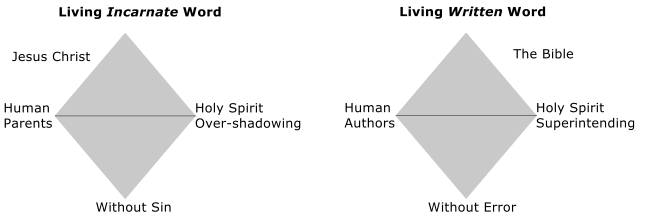Snap Shot
All Scripture is given by the inspiration of God (cf. 2 Timothy 3:16); therefore, it is inerrant (free from error) because God is true.
Inspiration
A young seminar student, who was a student pastor at a small, rural church, relayed a question to his class asked by his congregation,
“If the Bible says it, can I believe it?”
Regrettably, it is a question that still resonates throughout churches today.
However, Paul answered such a question centuries ago in his letter to Timothy, the young pastor at Ephesus:
“All scripture is given by inspiration of God, and is profitable for doctrine, for reproof, for correction, for instruction in righteousness: That the man of God may be perfect, throughly furnished unto all good works” (2 Timothy 3:16-17 KJV).
This is the only place in the New Testament that the word inspiration (Gk. theopneustos) is used.
It means God-breathed.
So what Paul was telling Timothy then, and all those who may question the authority of the Scripture thereafter, is God-breathed every Scripture, and thus, every Scripture is true because God cannot lie (cf. Titus 1:2).
Of course, at the time of his writing, Paul was referencing the Old Testament Scriptures. In fact, every place in the New Testament where the term Scripture is used it is referencing the Old Testament writings.
Except one.
That is where the Apostle Peter cites Paul’s letters and the other Scriptures (cf. 2 Peter 3:15, 16). Thus, with Peter’s inclusion, that inspiration Paul spoke of regarding the Old Testament Scriptures also now applies to those of the New Testament.
Revelation
It is important to recognize the difference between inspiration and revelation.
Simply put, inspiration is the God-breathed action that ultimately wrote the Scriptures through select men;
revelation is the unveiling to any and all men the understanding of those Scriptures.
Both inspiration and revelation were, and are, the work of God the Holy Spirit (cf. 2 Peter 1:20, 21; John 14:26, 16:13).
Inerrancy
“Inspiration accounts for inerrancy, and inerrancy proves inspiration.”[1]
Since God is true in nature, His Word was true when spoken; thus, the inerrancy of Scripture simply means the Bible is fully truthful in all its teachings.
Supportively, Jesus was the Word made flesh (cf. John 1:1-3, 14). In penning this passage John (through the Holy Spirit) used the same word became (‘…were made…’) in verse 3 and verse 14 (‘…was made…’).
Thus, “all things became through Him; He in turn became flesh.
He became that which first became through Him.
In becoming, He did not cease to be the Eternal Word.”[2]
And as the eternal Word there is no err, just as He prayed to the Father: “Sanctify them in the truth; your word is truth” (John 17:17 ESV).
“By this word [inerrancy] we mean that the Scriptures possess the quality of freedom from error. They are exempt from the liability of mistake, incapable of error. In all their teachings they are in perfect accord of the truth.”[3]
Conclusion
Because the Bible is inspired (God-breathed), it is also inerrant which means the Bible is without error. Thus, in the original documents and everything that it addresses is without error in fact or understanding.
The following chart[4] may assist in understanding inspiration (God-breathed by the Holy Spirit), the human elements, and the “withouts” (sin and error).




